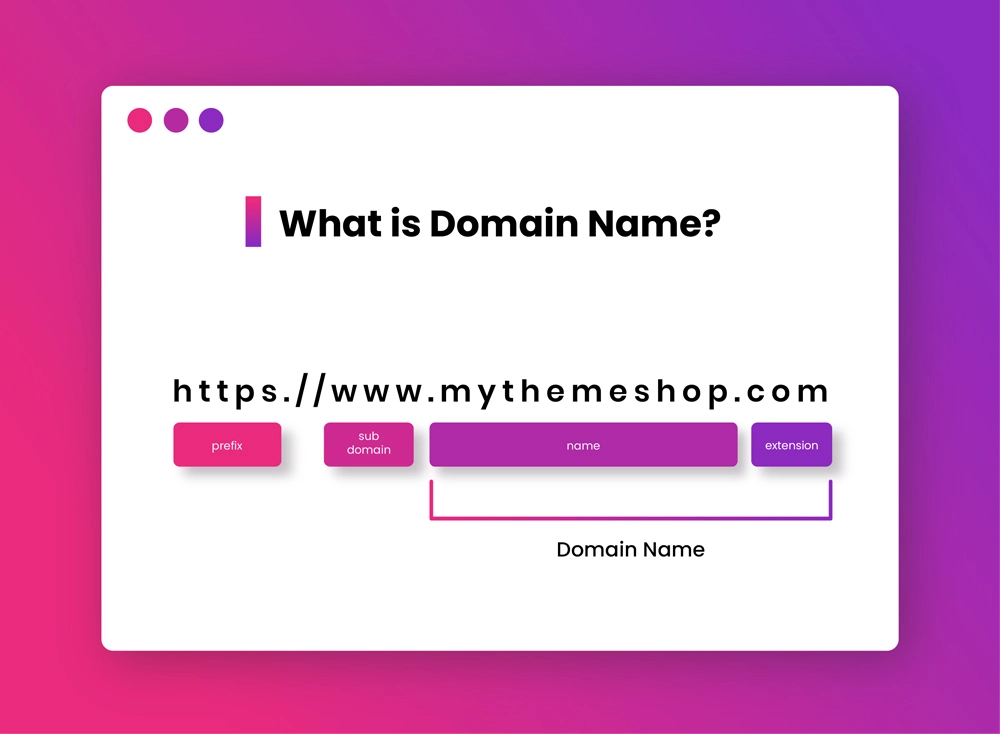What is a domain name and why it matters
Have you ever used your computer to type “www.google.com“? A domain name is that. It may appear to be a mere string of letters or phrases, but underneath those basic characters is something strong—the entryway to every website on the internet.
We’ll explain What is a domain name and why it matters, how it functions, and why picking the appropriate one is crucial for your online presence in this blog.

What is a Domain Name?
Let’s begin with the basics.
The address that users enter into a web browser to access your website is known as its domain name. Your website has a domain name, just like your house has a street address.
For instance:
- Facebook.com
- Amazon.in
- yournameblog.com
Consider it the online name and identity of your website. You can use a name that is simpler to remember and recognise, like google.com, rather than having to memorise a lengthy string of numbers, like the IP address 142.251.33.78.
The Technical Side (Without Getting Too Nerdy)
A server with an IP address hosts every website on the internet. However, let’s face it: no one wants to enter a long list of numbers each time they wish to shop online or read a blog.
Domain names can help with it.
The following occurs when you enter a domain into your browser:
- To determine which server owns that domain name, your browser makes a request to a specialised system known as the DNS—Domain Name System.
- The domain is converted into the appropriate IP address via DNS.
- The website loads after your browser establishes a connection with that server.
All of this takes milliseconds, so you don’t see it happening. However, it’s a clever technology that operates in the background each time you use the internet.
The Structure of a Domain Name
There are various components to a domain name. Let’s dissect it:
For instance: www.example.com
- WWW: The subdomain is this. It is primarily used for web browsing and is optional.
- Example: This is the second-level domain, for instance. It’s the section you select and sign up for. It’s your name or brand.
- .com: The top-level domain (TLD), which includes.com,.org,.net,.in, and others, is.com.
The entire domain name is made up of these three components. You can have various combinations, such as:
- MyBusiness.org
- travelblog.net
- cafe24.in
They’re all different!
Why Does a Domain Name Matter?
Now that you understand what a domain name is, let’s look at why it’s important:
1. It Increase Credibility and Trust:
A professionally designed domain address instantly lends credibility on your website. Compared to greenearthclothing123.freeblogsite.com, people are much more likely to trust www.greenearthclothing.com.
Having an appropriate domain name for your business, blog, or portfolio conveys to visitors that you are a trustworthy and legitimate entity.
2. It Showcases Your Brand:
Your brand includes your domain. Selecting the appropriate domain makes you stand out and lets visitors know what to anticipate.
For instance:
- It’s obvious that yummykitchen.com is a restaurant or food blog.
- A tech website or forum may be geektechhub.net.
You understand that even before someone views your website, your domain speaks volumes about you.
3. It Facilitates Your Detection:
It is simpler to enter, remember, and search for a clear, pertinent domain name. This is important because:
- Word-of-mouth advertising
- Returning guests
- Search Engine Optimisation, or SEO
People remember a brief, memorable, and pertinent domain.
4. You Gain Ownership:
You becomes the owner of that online identity when you register a domain (as long as you keep renewing it). No one else is able to utilise it.
You have all control now. You could:
- Create a webpage
- Create business-oriented emails, such as info@yourdomain.com.
- Upload it to a different website or social media account.
It is your digital property.
Tips for Choosing the Right Domain Name:
Picking a domain isn’t something to rush. Here are some human-friendly tips to get it right:
✅ Keep it short and simple
The shorter, the better. Avoid long, confusing, or hard-to-spell names.
✅ Make it brandable
Use a name that’s unique and memorable. Think: Zomato, Flipkart, Nykaa.
✅ Use keywords if it fits
If possible, include a keyword that relates to your content or business, like bestbakerydelhi.com.
✅ Avoid numbers and hyphens
They make your domain harder to remember and more prone to typos.
✅ Choose the right extension
.com is the most popular and trusted.
.in is great for Indian businesses.
.org is usually for nonprofits.
.net is for network-based sites.
Where Can I Find My Domain Name?
Through a domain registrar, you may purchase and register a domain name. Among the well-known registrars are:
- GoDaddy
- Namecheap
- Hostinger
- Bluehost
Simply look up the domain you want, check to see if it’s available, then register it, generally for a period of one year or longer.
The brand name and extension have an impact on the price. Basic domains typically cost between ₹500 and ₹1000 annually, however some premium ones may be pricey.
What Happens After You Buy a Domain?
Once your domain has been purchased, you can:
- Use a website builder such as Squarespace, Wix, or WordPress to link it to a website.
- Create business email accounts, such as contact@yourbusiness.com.
- Send it to a different website or social media platform.
- If it gains value, sell it later.
Final Thoughts:
A domain name serves as your brand, identity, and initial online impression in addition to being an address. Your domain name is a crucial first step whether you’re beginning a blog, a business, or a portfolio.
Spend some time selecting the best one. It’s worthwhile.
Additionally, keep in mind that although the internet is vast, having the appropriate domain allows you to establish your own presence there.
Do you have a domain in mind? You could be one step closer to creating your own digital home if you go see whether it’s accessible.
